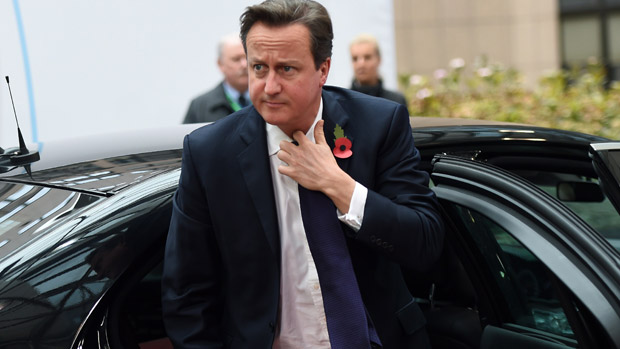Recession 'red alert': PM seeks to scare us into voting Tory
Don’t they know it's Christmas time at Tory HQ? Expect austerity not handouts from Osborne in December

A free daily email with the biggest news stories of the day – and the best features from TheWeek.com
You are now subscribed
Your newsletter sign-up was successful
David Cameron’s “red light” warning about the global economy is being seen as part of a Tory general election strategy to make voters very, very afraid that the Two Eds - Balls and Miliband - would wreck the fragile UK recovery.
Writing for The Guardian, Cameron raised the spectre of recession in lurid terms, saying “red warning lights are flashing on the dashboard of the global economy” and a second global crash could be looming.
It was designed to give better-off Guardian readers nightmares about bogeyman Ed Balls, the shadow chancellor, and his geeky master, Ed Miliband, targeting the comfortably-off with their dreaded Mansion Tax, and upsetting the applecart in their bid to raise living standards across the board.
The Week
Escape your echo chamber. Get the facts behind the news, plus analysis from multiple perspectives.

Sign up for The Week's Free Newsletters
From our morning news briefing to a weekly Good News Newsletter, get the best of The Week delivered directly to your inbox.
From our morning news briefing to a weekly Good News Newsletter, get the best of The Week delivered directly to your inbox.
Journalists accompanying the PM on his trip to Australia for the G20 were in no doubt. Guardian political editor Patrick Wintour writes: “Politically, Conservatives believe an emphasis on the risks still facing the UK will make anxious voters recoil from handing stewardship of a fragile economy to a relatively untried Labour team.”
Cameron gives the game away in the final paragraph of his article: “In six months’ time, Britain will face a choice: the long-term plan that has seen it prosper, or the easy answers that would surely have seen it fail…”
Wintour points out some recent polling has seen the economy decline as an issue for voters, partly because there is a belief that the recovery is secured, leading to issues such as the health service and living standards - which have been seized upon by Labour - to rise in importance.
George Osborne, the Chancellor, is now expected to use the Autumn Statement on 3 December to give another scary forecast of what would happen in Britain if Labour were to win power and Ed Balls implemented Plan B - higher taxes, higher spending, a widening deficit.
A free daily email with the biggest news stories of the day – and the best features from TheWeek.com
Nick Robinson, the BBC’s political editor, told Radio 4’s Today programme that Cameron was trying to get the political issue off immigration - Ukip’s strong suit - and back onto the economy.
“He is doing what he calls ‘pitch rolling’ - preparing for the big match that is the Autumn Statement where the Chancellor may have to explain some bad data showing borrowing, far from doing down, is going up again.”
Robinson predicted that instead of offering pre-Christmas “handouts”, Osborne will be announcing “takeaways” with the threat of more austerity ahead.
There is alarming evidence that whoever wins the next election, there is worse to come.
In 2010, Osborne forecast the deficit would be down to £37.5 billion by now. But he will have to tell Parliament that a fall in tax receipts - due in part to the falling price of oil, and to the general lack of wage rises - means the deficit is growing and nearer £100 billion.
The Institute for Fiscal Studies said last week that public spending cuts will be needed post-2015 at least as big as those in the 2010-2015 Parliament, possibly as high as £50 billion.
Against that background, Cameron’s Tory conference speech promising £7.5bn in tax cuts for middle income earners looks positively reckless.
As Robinson pointed out, Cameron’s “red light” warning echoes the thoughts of Mark Carney, Governor of the Bank of England, who has raised the spectre of recession, disappointing growth and falling growth in the eurozone, Britain’s vital export market.
The latest inflation figures are out tomorrow and The Independent says Carney may have to write his first letter to the Chancellor explaining why they are higher than the two per cent target.
Cameron’s problem is that most voters don’t seem to have been experiencing the recovery in the first place. Even ex-PM John Major says so. He told the Andrew Marr Show yesterday: "We still have people concerned and worried – none of the growth in the economy has yet reached wage packets or salary slips.”
Which allowed Chris Leslie, shadow chief secretary to the Treasury, to respond: “David Cameron claims his policies are working, but as even Sir John Major admits, most people still aren’t feeling the recovery.”
Today, a group of academics from the LSE and the Institute for Social and Economic Research at the University of Essex are due to publish a report showing that the rich have got richer and the poor have got poorer under the coalition government. Two-earner households and those with elderly members have gained most while lone-parents have done worst.
It helps explain why Labour has extended its poll lead to four points in a ComRes poll for theSunday Mirror poll released yesterday, even though only one in five people say they can imagine Ed Miliband as prime minister.
-
 Buddhist monks’ US walk for peace
Buddhist monks’ US walk for peaceUnder the Radar Crowds have turned out on the roads from California to Washington and ‘millions are finding hope in their journey’
-
 American universities are losing ground to their foreign counterparts
American universities are losing ground to their foreign counterpartsThe Explainer While Harvard is still near the top, other colleges have slipped
-
 How to navigate dating apps to find ‘the one’
How to navigate dating apps to find ‘the one’The Week Recommends Put an end to endless swiping and make real romantic connections
-
 The high street: Britain’s next political battleground?
The high street: Britain’s next political battleground?In the Spotlight Mass closure of shops and influx of organised crime are fuelling voter anger, and offer an opening for Reform UK
-
 Is a Reform-Tory pact becoming more likely?
Is a Reform-Tory pact becoming more likely?Today’s Big Question Nigel Farage’s party is ahead in the polls but still falls well short of a Commons majority, while Conservatives are still losing MPs to Reform
-
 Taking the low road: why the SNP is still standing strong
Taking the low road: why the SNP is still standing strongTalking Point Party is on track for a fifth consecutive victory in May’s Holyrood election, despite controversies and plummeting support
-
 What difference will the 'historic' UK-Germany treaty make?
What difference will the 'historic' UK-Germany treaty make?Today's Big Question Europe's two biggest economies sign first treaty since WWII, underscoring 'triangle alliance' with France amid growing Russian threat and US distance
-
 Is the G7 still relevant?
Is the G7 still relevant?Talking Point Donald Trump's early departure cast a shadow over this week's meeting of the world's major democracies
-
 Angela Rayner: Labour's next leader?
Angela Rayner: Labour's next leader?Today's Big Question A leaked memo has sparked speculation that the deputy PM is positioning herself as the left-of-centre alternative to Keir Starmer
-
 Is Starmer's plan to send migrants overseas Rwanda 2.0?
Is Starmer's plan to send migrants overseas Rwanda 2.0?Today's Big Question Failed asylum seekers could be removed to Balkan nations under new government plans
-
 Has Starmer put Britain back on the world stage?
Has Starmer put Britain back on the world stage?Talking Point UK takes leading role in Europe on Ukraine and Starmer praised as credible 'bridge' with the US under Trump